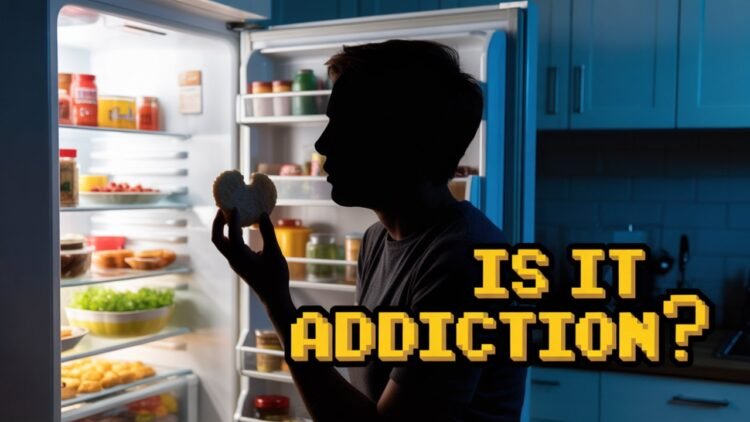Have you ever ever discovered your self staring on the backside of a chip bag or an empty ice cream carton, with solely a fuzzy reminiscence of how you bought there? You inform your self, “only one,” however that one turns into ten, and earlier than you recognize it, the entire thing is gone. Then comes the wave of guilt, disgrace, and feeling completely powerless. If that sounds even vaguely acquainted, I want you to listen to this loud and clear: This isn’t a failure of willpower.
The truth is definitely way more stunning. The meals you’re consuming can actually hijack your mind, making a compulsive cycle that appears uncannily like drug habit. The truth is, latest knowledge reveals that the worldwide prevalence of meals habit is round 20%. That’s about 1 in 5 individuals who may need addictive-like consuming patterns. This isn’t about being weak—it’s about your mind’s historic survival programming being outsmarted by trendy, processed meals. On this video, we’re going to interrupt down the science behind what’s taking place and, extra importantly, provide you with a sensible, step-by-step plan to take again management.
Your Mind’s Reward System: Designed for Survival, Exploited by Meals
So, how does this hijacking even occur? To get it, we have to take a look at your mind’s reward system. Deep inside your mind, there’s a strong, primitive circuit that has one primary job: maintain you alive. While you do one thing that helps you survive—like consuming, ingesting water, or connecting with individuals—this method releases a neurotransmitter known as dopamine.
Now, dopamine will get known as the “pleasure molecule,” but it surely’s actually extra of a “motivation molecule.” It sends a easy, highly effective message to your mind: “That was good! Let’s do this once more.” This dopamine hit reinforces the habits, hardwiring you to need to do it once more. In a pure setting, this method is flawless. Consuming a ripe piece of fruit would provide you with a pleasant, small burst of dopamine, encouraging you to search out extra. It’s an excellent evolutionary design.
However right here’s the catch: the trendy meals setting is something however pure. The issue with right this moment’s ultra-processed meals is that they ship a reward that’s far more highly effective than something our ancestors ever discovered. An apple may trigger slightly bump in dopamine, however meals engineered to be overloaded with sugar, fats, and salt may cause an enormous surge, flooding your mind with pleasure indicators. And this isn’t an accident; these meals are deliberately designed to be “hyper-palatable,” making them virtually not possible to withstand.
The Hijack: How Meals Turns into a Drug
That is the place the story takes a darker flip. That intense dopamine rush from hyper-palatable meals is so sturdy that it fires up the very same neural pathways as addictive medication like cocaine and heroin. Mind scans really affirm this. They present the identical pleasure facilities within the mind lighting up, whether or not somebody is craving junk meals or a drug. Your mind can’t inform the distinction; it simply is aware of it obtained an intense reward, and it desires extra.
However our brains are good, they usually attempt to adapt. When you maintain flooding your mind with that a lot dopamine, it begins to guard itself by shutting down a few of its dopamine receptors. That is known as constructing a tolerance, and it’s a basic signal of habit. Now, it is advisable to eat an increasing number of of that very same meals simply to really feel the identical degree of delight. What as soon as gave you an enormous rush now barely makes you are feeling regular. Over time, the pleasure you get from these meals retains dropping, however the longing for them will get even stronger—a vicious cycle that’s the very definition of habit.
This course of isn’t only a feeling; it bodily modifications your mind’s construction. Key areas, just like the elements of the mind that regulate reward and urge for food, can really be rewired. This rewiring makes you extra impulsive and drives you to hunt out these meals, even whenever you logically know they’re unhealthy for you. It’s a measurable, organic change.
The Excellent Storm: Hormones and Stress
And it’s not nearly dopamine. Meals habit is commonly an ideal storm of biology and psychology. Continual stress, as an example, performs an enormous half. While you’re stressed, your physique pumps out a hormone known as cortisol. Cortisol doesn’t simply make you hungry; it particularly makes you crave high-fat, high-sugar “consolation” meals. It’s your physique’s survival mechanism gone haywire; it thinks you want a fast shot of power to combat off a risk, so it sends you on a mission for probably the most calorie-dense meals you could find. This forges a powerful hyperlink between your feelings and your consuming, turning meals into your go-to coping software for stress, anxiousness, and even boredom.
On the identical time, this complete course of messes with different essential hormones. Leptin, the hormone that claims “I’m full,” and ghrelin, the one that claims “I’m hungry,” can get thrown fully out of whack. Your mind can turn into proof against leptin, that means you by no means actually really feel glad. It’s just like the “off” change to your urge for food is damaged. While you mix these hormonal points with psychological triggers and even a genetic predisposition, you’re caught in a strong entice that may really feel not possible to interrupt out of.
The Blueprint for Reclaiming Management
Okay, so now that you simply perceive the science behind the entice, you can begin to dismantle it. This isn’t about some depressing crash eating regimen or a take a look at of your willpower. It’s about strategically rewiring your mind and taking again management, one step at a time.
Step 1: Determine Your Triggers.
First issues first: you need to turn into a detective in your personal life. You could pinpoint precisely which meals and conditions kickstart your cravings. For only one week, maintain a easy meals and temper journal. Jot down what you eat, whenever you eat, and—most significantly—the way you have been feeling proper earlier than. Had been you pressured? Bored? Lonely? Drained? Seeing these patterns is the primary and most crucial step to breaking them.
Step 2: Engineer Your Setting.
Let’s be actual: in case your set off meals are in your home, you’re going to eat them. It’s not a matter of if, however when. The only handiest factor you are able to do is create a protected zone. Undergo your pantry, your fridge, your automobile, and your desk at work. Eliminate the meals you’ve recognized as triggers. Change them with more healthy, whole-food choices. This isn’t about depriving your self; it’s about making the appropriate selection the simple selection.
Step 3: The Foundational Reset.
To actually break the cycle of intense cravings, it may be extremely highly effective to take a short lived break from the principle offenders. Consider it as a reset to your mind’s reward system. By avoiding these hyper-palatable meals for some time, you give your dopamine receptors an opportunity to turn into delicate once more. For this era, deal with consuming complete, unprocessed meals—issues like fruits, greens, lean proteins, and wholesome fat. It will assist stabilize your blood sugar and may slash your cravings dramatically.
Step 4: Eat with Intention.
Meals habit thrives on autopilot—on senseless, computerized consuming. The antidote to that’s conscious consuming. It simply means paying full consideration whenever you eat. Decelerate. Put your fork down between bites. Truly style the flavors and really feel the textures of your meals. Take heed to your physique’s actual indicators of starvation and fullness. This observe helps sever that computerized hyperlink between a set off and a binge, placing you again in acutely aware management.
Step 5: Construct a More healthy Toolkit.
As you progress ahead, the purpose is to search out wholesome stand-ins to your outdated go-tos. When you crave one thing candy, attempt a bit of fruit. When you want one thing crunchy and salty, go for some nuts or seasoned roasted chickpeas. And don’t neglect about train! It’s a tremendous software for managing stress and can provide you a pure dopamine increase that helps cut back cravings.
Part 5: You Are Not Alone
Making an attempt to beat meals habit can really feel isolating, however you completely would not have to do it alone. Reaching out for assist is an indication of power, by no means weak point. Skilled assist could be a game-changer. A therapist who makes a speciality of consuming problems will help you unpack the emotional triggers with approaches like Cognitive Behavioral Remedy (CBT). A registered dietitian will help you construct a satisfying, nourishing consuming plan that doesn’t really feel restrictive.
Assist teams, akin to Overeaters Nameless, additionally provide an unimaginable sense of neighborhood. There’s actual energy in connecting with individuals who know precisely what you’re going by way of. Sharing your story with others who get it may be validating and extremely empowering.
The struggle in opposition to your meals cravings isn’t being fought in your tongue; it’s being fought in your mind. Meals habit is an actual, organic situation, sparked by the large hole between our historic wiring and our trendy meals world. Extremely-processed meals, designed to be irresistible, can hijack our mind’s reward facilities, trapping us in a cycle of tolerance, cravings, and a lack of management that appears identical to substance habit.
However understanding the science is your key to freedom. By determining your triggers, controlling your setting, resetting your system with actual meals, and training mindfulness, you can begin to interrupt that cycle. You possibly can rewire your mind and reclaim your well being. This can be a journey, and each single small, intentional selection you make is a win.
If this video was useful, please hit that like button and subscribe for extra movies that break down the science of your well being. I’d additionally love to listen to from you within the feedback: What’s one small step you may take this week to begin taking again management? Sharing your purpose could be a highly effective approach to start.



